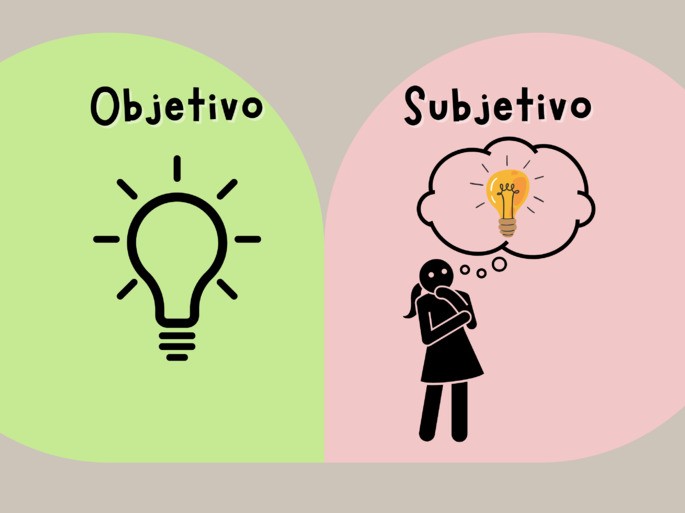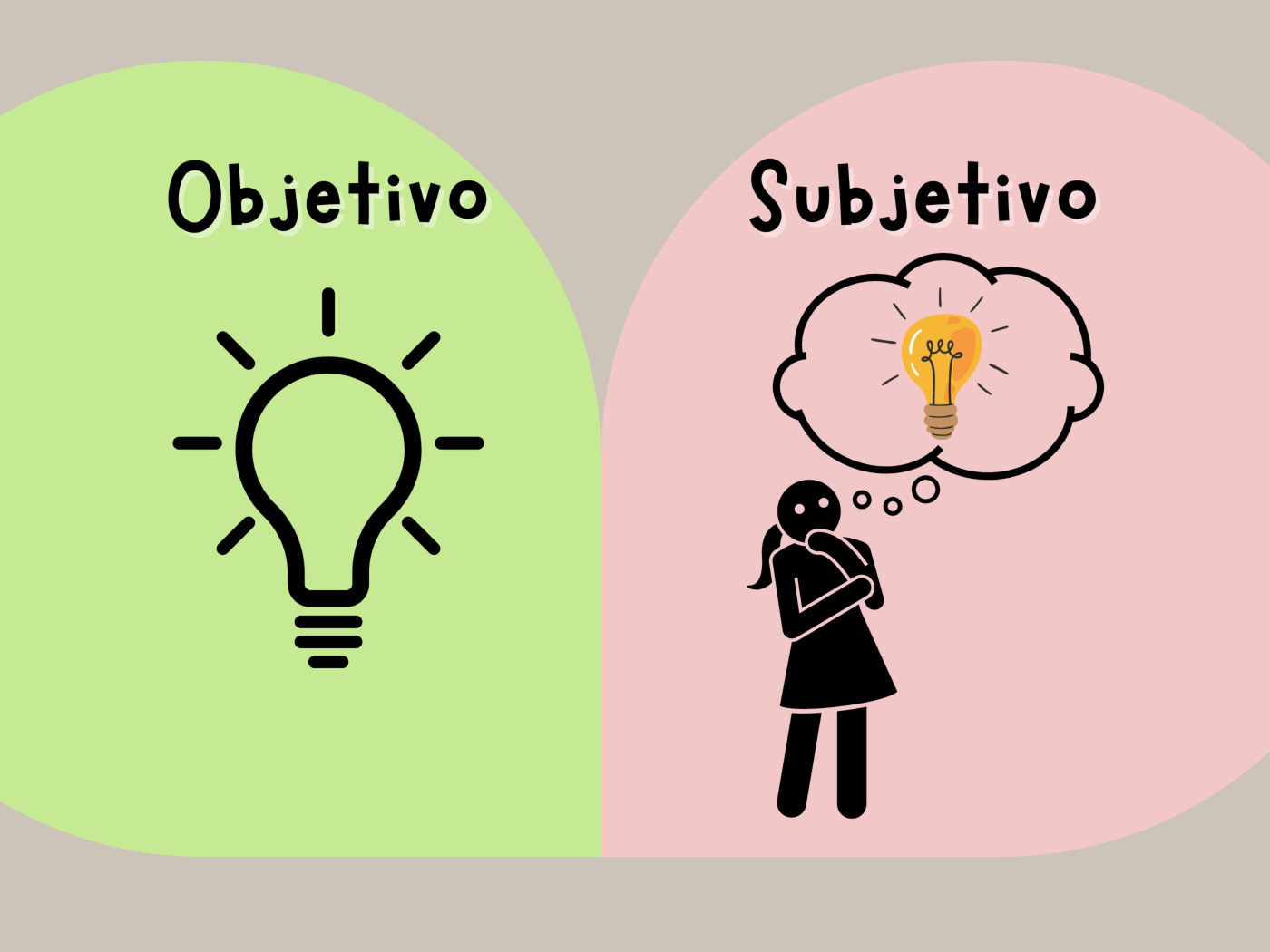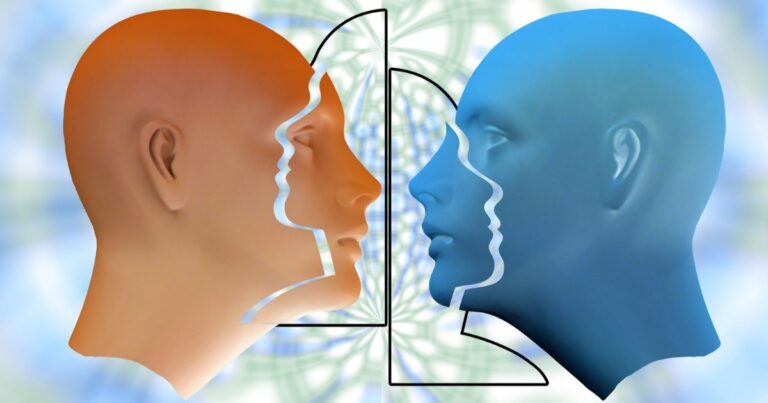Objective and subjective are words used to qualify the way people describe reality. Objective is what is relative to the object and its reality. It is subjective that which is relative to the subject who observes and his way of perceiving the reality of the object.
The difference between objective and subjective is that the objective is independent of a person’s emotions, while something subjective is related to the person’s feelings and views.

Thus we have that facts are objective while opinions are subjective. For example, “Storm Bella left a balance of material losses in the order of 100 million dollars in Galicia” is an objective statement, it is a fact that is being presented. On the other hand, “Storm Bella bathed the Christmas celebrations in Galicia with sadness” is a subjective assessment, someone is expressing an opinion regarding a fact.
| Objective | Subjective | |
|---|---|---|
| Definition | Relating to the object and its reality. | Pertaining to the subject and his way of perceiving the reality of the object. |
| Etymology | Latin obiectus: “put up front.” | Latin subiectivus: “to depend on something else” |
| Feature |
|
|
| Example |
|
|
What is objective
Objective refers to that which is proper to the object and is valid for everyone. It can be measured or appreciated without the intervention of the subject’s opinion. For example, that a mountain measures 8000 m is objective, regardless of what one thinks of it.
The word “objective” comes from the Latin obiectus meaning “to put before”. It is used as a synonym for impartial or neutral. When something or someone is objective, it shows the facts or things as they are. For example, an objective indicator of career success might be a promotion.
The objective quality is the objectivitythe condition that something is valid for everyone, regardless of the individual point of view. Through objectivity, the object is presented as it is, devoid of the preferences or opinions of the presenter. It is the ideal of scientific research, since it allows the presentation of facts in a verifiable form.
Objectivity can be manifested in different ways, such as, for example, in language and in the type of knowledge that is generated from it.
Objective language
An objective language is neutral, it does not lean toward or favor any interpretation. It is the preferred language in academic and scientific publications.
An example of objective language is: “the flowers are yellow with 5 petals joined at the base”. In this case a non-judgmental description of a flower is made.
Objective knowledge
Objective knowledge is that precise stored information that someone possesses about a subject. It directly reflects what we know.
Objective knowledge can be assessed through questionnaires on a topic. This is a measure of the true information that the person possesses about that topic.
For example, a study on the approval of the edible use of recycled water assessed a population’s objective knowledge about the processing of sewage to make it potable.
You may also be interested in Inductive and deductive method.
What is subjective
Subjective refers to that which is intrinsic to the individual, his or her way of thinking, consciousness, preferences, experiences and judgments. For example, one person may find a food exquisite, while another dislikes it. In this case we are dealing with a subjective appreciation of a dish.
The word “subjective” comes from Latin subiectivus which means “to depend on something else”. In this sense, the subjective belongs to the subject, is not observable and is nuanced by the particular circumstances of each person.
The quality of subjective is the subjectivity, the condition or character attributed to individual mental processes. It is inherent to the human condition, which is why it is difficult to detach oneself from it in certain situations, such as in artistic appreciation, opinion journalism and the application of laws.
As such, subjectivity may be present in how we express ourselves through language and how we demonstrate our knowledge.
Subjective language
Subjective language is inclined to favor the point of view of the one who uses it. It is the language applied in literary, artistic or opinionated expressions.
An example of subjective language such as “the beautiful yellow flowers” or “the boring yellow flowers” allude to someone who likes or dislikes yellow flowers.
Subjective knowledge
Subjective knowledge is an individual’s perception of what he or she knows about something. It is a reflection of what we think we know. This is applied to address a person’s confidence about his or her knowledge about a given topic.
Subjective knowledge is addressed through questions of the type “how much do you know about this?”, the answers to which may be in a range between “I know nothing” or “I know everything about this”.
Subjective knowledge is used in some areas to determine the degree of acceptance of a product or service. For example, a person’s subjective knowledge about the scientific basis of a drug may affect his or her confidence in the drug.
You may also be interested in:
References
Abbagnano, N. (1993) Diccionario de filosofía. Fondo de Cultura Económica, Mexico.
Carlson, J.P, Vincent, L.H., Hardesty, D.M., Bearden, W. O. (2009) Objective and Subjective Knowledge Relationships: A quantitative analysis of consumer research findings. J.Consumer Res. 35: 864-876.
Mahmoud-Elhaj, D. Tanner, B. Sabatini, D., Feltz, A. (2020) Measuring objective knowledge of potable recycled water. J. Community Psychol. 48:2033-2052




